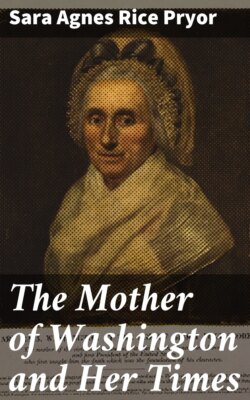Читать книгу The Mother of Washington and Her Times - Sara Agnes Rice Pryor - Страница 27
На сайте Литреса книга снята с продажи.
YOUNG MEN AND MAIDENS OF THE OLD DOMINION
ОглавлениеTable of Contents
The social setting for Mary Ball—now a young lady—is easily defined. It matters little whether she did or did not visit her brother in England. She certainly belonged to the society of Westmoreland, "the finest," says Bishop Meade, "for culture and sound patriotism in the Colony." Around her lived the families of Mason, Taliaferro, Mountjoy, Travers, Moncure, Mercer, Tayloe, Ludwell, Fitzhugh, Lee, Newton, Washington, and others well known as society leaders in 1730. If she was, as her descendants claim for her, "The Toast of the Gallants of Her Day," these were the "Gallants,"—many of them the fathers of men who afterward shone like stars in the galaxy of revolutionary heroes.
The gallants doubtless knew and visited their tide-water friends—the Randolphs, Blands, Harrisons, Byrds, Nelsons, and Carters—and, like them, followed the gay fashions of the day. They wrote sonnets and acrostics and valentines to their Belindas, Florellas, Fidelias, and Myrtyllas—the real names of Molly, Patsy, Ann, and Mary being reckoned too homespun for the court of Cupid. These gallants wore velvet and much silk; the long vests that Charles the Second had invented as "a fashion for gentlemen of all time"; curled, powdered wigs, silver and gold lace; silken hose and brilliant buckles. Many of them had been educated abroad, or at William and Mary College—where they had been rather a refractory set, whose enormities must be winked at—even going so far as to "keep race-horses at ye college, and bet at ye billiard and other gaming tables." Whatever their sins or shortcomings, they were warm-hearted and honorable, and most chivalrous to women. It was fashionable to present locks of hair tied in true-lovers' knots, to tame cardinal-birds and mocking-birds for the colonial damsels, to serenade them with songs and stringed instruments under their windows on moonlight nights, to manufacture valentines of thinnest cut paper in intricate foldings, with tender sentiments tucked shyly under a bird's wing or the petal of a flower.
With the youthful dames themselves, in hoop, and stiff bodice, powder and "craped" tresses, who cut watch-papers and worked book-marks for the gallants, we are on terms of intimacy. We know all their "tricks and manners," through the laughing Englishman, and their own letters. An unpublished manuscript still circulates from hand to hand in Virginia, under oath of secrecy, for it contains a tragic secret, which reveals the true character of the mothers of Revolutionary patriots. These letters express high sentiment in strong, vigorous English, burning with patriotism and ardent devotion to the interests of the united colonies—not alone to Virginia. The spelling, and absurdly plentiful capitals, were those of the period, and should provoke no criticism. Ruskin says, "no beauty of execution can outweigh one grain or fragment of thought." Beauty of execution and good spelling, according to modern standards, do not appear in the letters of Mary Ball and her friends, but they are seasoned with many a grain of good sense and thought.
Of course we cannot know the names of her best friends. Her social position entitled her to intimacy with the sisters of any or all of the "gallants" we have named. She might have known Jane Randolph, already giving her heart to plain Peter Jefferson, and destined to press to her bosom the baby fingers that grew to frame the Declaration of Independence; or Sarah Winston, whose brilliant talents flashed in such splendor from the lips of Patrick Henry; or ill-starred Evelyn Byrd, whose beauty had fired the sluggish veins of George II and inspired a kingly pun upon her name, "Much have I heard, lady, of thy fair country, but of the beauty of its birds I know but now,"—all these and more; to say nothing of the mother of Sally and Molly Cary, of Lucy Grymes, of Betsy Fauntleroy, and of Mary Bland, each of whom has been claimed by Lossing and others to be the Lowland beauty, to whom her illustrious son wrote such wonderful sonnets, but quite impossible in the case of Mary Bland, seeing she was born in 1704, and was some years older than his mother.
They were a light-hearted band of maidens in these pre-Revolutionary days in the "Old Dominion!" They had no dreams sadder than mystic dreams on bride's cake, no duties except those imposed by affection, no tasks too difficult, no burdens too heavy. They sang the old-time songs, and danced the old-time dances, and played the old-time English games around the Christmas fires, burning nuts, and naming apple seeds, and loving their loves "with an A or a B," even although my Lady Castlemaine, of whom no one could approve, had so entertained her very doubtful friends a hundred years before. They had the Pyrrhic dances, but they had the Pyrrhic phalanx as well! The "nobler and manlier lessons" were not forgotten in all the light-hearted manners of the age.
